Table of contents
Introduction to Colon Cancer
Colon, or colorectal, cancer begins in the large intestine or rectum. The large intestine, also known as the colon, is the final part of the digestive tract. The rectum starts just after the colon. Colon cancer genetic testing can ultimately lead to earlier detection of this commonly acquired and inherited cancer.
Colon cancer always begins in the rectum or colon but may spread to other parts of the digestive tract. This type of cancer is one of the most fatal and is the second cause of cancer deaths in adult men and women. It is one of the trickiest types of cancer, given that there are no real changes in the body at development stages. Instead, it develops from noncancerous cell clumps known as polyps. Polyposis syndrome, if left unchecked, can develop into colon cancers.
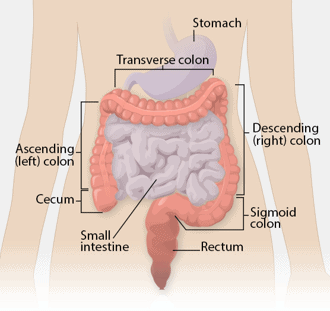
Early detection is a key to good prognosis. The Centers for Disease Control and Prevention (CDC) recommends that adults 45-75 years get regularly screened for colon cancer. This screening usually involves looking for abnormal polyps in the colon.
The symptoms of colon cancer include:
- Increased frequency of stooling, including diarrhea and constipation
- Rectal bleeding or blood in your stool
- Persistent occurrence of abdominal cramps and other abdominal discomforts
- Feeling full after stooling
- Fatigue and weakness
- Unexplained sudden loss of weight
Genetic testing is one way for individuals to assess their risk of developing colon cancer, especially if their family history is unknown. High risk patients may want to talk with their doctor about developing a screening plan that is more frequent than recommended to the general population.
The major treatments for colon cancer include surgery, chemotherapy, radiation, and targeted drugs medications. Some of the treatments may be performed simultaneously.
Why Should you Get Colon Cancer Genetic Testing?
Colon cancer, like other cancers, is genetic. This means that it is caused by genetic mutations that are either acquired over a lifetime with no hereditary component or inherited. Colon cancer is one of the most common inherited cancer syndromes. Approximately 5 to 10 percent of colon cancer is hereditary.
By understanding your risk, you and your doctor can plan for earlier or more frequent colonoscopies to improve your chances of early detection and treatment, which ultimately leads to a better prognosis.
Lynch syndrome and Familial Adenomatous Polyposis (FAP) are the most common types. Beyond that, about 25 to 35 percent of cases occur more often in individuals with a family history of colorectal cancer, indicating that you may be at higher risk if family members also have it.
APC Gene
This gene is associated with FAP, a severe form of the condition when individuals develop many polyps starting around age 16. Almost everyone with this gene will develop the condition.
APC encodes for the APC protein whose primary function is to act as a tumor suppressor. This role makes it one of the major genes that prevent the irregular growth and division of cells. When there is an inherited alteration in the APC gene function, it would be unable to put the brake on uncontrolled cell developments. This leads to the extremely high development of polyps from which cancer cells develop.
MLH1, MLH2, MLH6, PMS2 and EPCAM Genes
These genes are linked to Lynch syndrome, the most common cause of a hereditary form of the condition.
These genes are mainly repair genes that help cells repair damaged DNA. When there is an alteration in the function of any of these genes, DNA error can go on unfixed, affecting growth-regulating genes such as the APC gene. This situation leads to the development of cancer cells.
Different genes are associated with different risks, with MLH1 and MLH2 having the highest amount of cancer risk.
STK11(LKB1) Gene
Inherited changes and alteration in the STK11 gene, another tumor suppressor gene, can lead to Peutz-Jeghers syndrome.
MUTYH
This gene usually helps cross-check DNA and helps fix the error. If there is an alteration in MUTYH gene, then it can cause MUTYH-associated Polyposis (MAP). Because MAP is a recessively inherited condition, an individual must receive the mutated gene from each parent to be affected.
These are the major genes responsible for colon or colorectal cancer, and an alteration in their function is usually not detected very early. However, with a genetic test, individuals can know their status and the risk of developing colorectal cancer. It is often helpful to follow up with genetic counseling after receiving your results.
Other associated genes include:
- PTEN
- CDH1
- BMPR1A and SMAD4
- CHEK2
- POLD1, POLE, and GREM1
There also appears to be a link between this condition and endometrial cancer (a cancer of the uterus) which may be associated with hereditary.
With genetic testing, an individual with a family history of contracting colon cancer will be able to identify their level of vulnerability. If there is a high level of vulnerability, they may be advised to go for more frequent screenings to help detect polyps from their colon or rectum before they have the chance to develop into cancer cells.
Options for Colon Cancer Genetic Testing
Genetic testing for colon cancer is one of the best ways to identify colon or colorectal cancer risk, given the difficulty of diagnosing it in its early stages when it can be more easily treated.
With genetic testing, individuals with hereditary mutations can be made aware of their risk and create a plan for regular check-ups to eliminate the excess formation of polyps.
Multiple genetic testing companies have options for colon cancer testing, specifically.
Fulgent Genetics for colon cancer genetic testing
Fulgent Genetics is a reputable genetic testing company that provides a vast range of genetic testing in different areas to help individuals and families learn their susceptibility to certain conditions and how they can promote a healthier life. Although tests can be done at home, they must be ordered through a doctor’s office.

Fulgent Genetic performs tests for hereditary cancer, identifying gene mutations with ancestral history so as to help patients promote a healthy routine to prevent or drastically reduce the development and advancement of cancer. This company offers colon cancer genetic testing.
The number of genes tested by Fulgent Genetics ranges from 18 to 22 for colorectal cancer to ensure that all relevant genes are examined for possible mutations that could aid the irregular formation of polyps in the colon or rectum. You can order a test kit and perform the test at home before mailing back the sample.
Cost: The firm does not reveal the price of their test kit and requests that interested clients sign up to the site and call the management for details. Interested applicants may be asked to provide personal or family medical records before getting details on the cost.
Reports: Fulgent reports will typically provide negative or positive results for 18 genes associated with colon cancer.
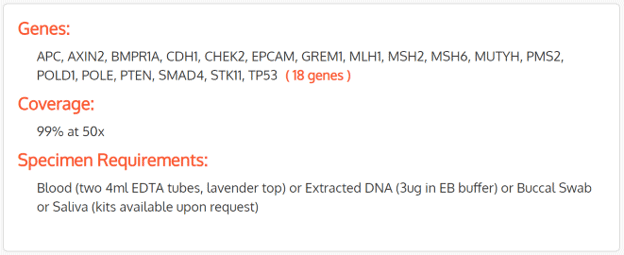
Visit our review on Fulgent Genetics to learn more about how the company provides genetic testing, costs, reports, and much more.
Ambry Genetics for colon cancer genetic testing
Ambry Genetics is a highly regulated genetic test company that performs tests for a vast range of hereditary conditions. It is a unique type of genetic firm as it requires a physician’s report before selling its test kits to interested patients. Patients can have their tests subsidized with insurance, and they can get any type of test done with a physician report that permits them to order for the test kit.
Ambry Genetics carries out genetic tests for hereditary cancer such as colon cancers and is well known for providing accurate results on the basis of a vast number of genes.
Ambry Genetics offers a test kit panel, and patients can provide their samples in three easy steps and send them back for results. The company offers a highly comprehensive cancer test. The firm can perform three types of tests, with all three providing results for all kinds of cancers.
The standard test, CancerNext, tests only 36 genes, which includes the most common genes associated with colon cancer. The two other tests, CancerNext-Extended and CustomNext-Cancer, tests 77 and 91 genes, respectively. Both tests offer a more comprehensive test that includes less common gene mutations.
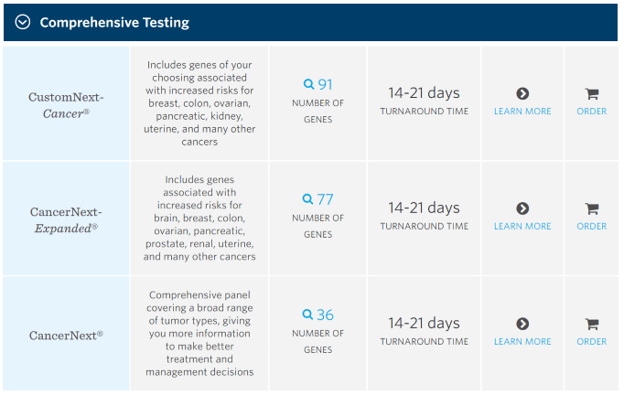
Cost: Ambry genetics tests are pretty high, even for insured users. A subsidized test kit costs as much as $100 or more, with pricing dependent on the patient’s financial status. For non-insured patients, the company is subtler about stating its prices. However, a Reddit user who ordered the test stated that the price was above $3000.
Reports: Ambry Genetics reports are typically comprehensive and easy to read as either positive or negative results. Below is the first page of a comprehensive report on a negative CancerNext report
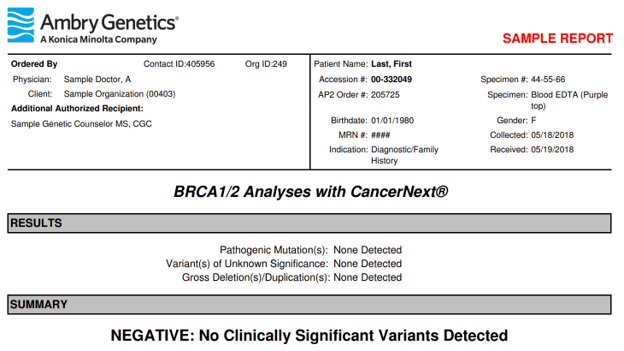
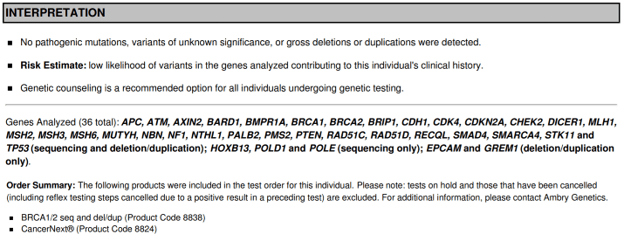
While there are many companies available to choose from, you should know that picking up a genetic lab test with a solid reputation is the key to a great and accurate test.
Visit our review on Ambry Genetics to learn more about how the company provides genetic testing, costs, reports, and much more.
Nebula Genomics
It’s clear that understanding your genome plays a key role in early treatment of hereditary cancer. Many genetic testing companies offer these types of tests in collaboration with physicians and can provide clinical diagnosis that allows you to work closely with a medical provider to develop a screening plan.
Some direct-to-consumer testing companies also offer tests that can be helpful in assessing your risks, without an initial visit to the doctor’s office.
Nebula Genomics is a privacy-focused DNA test platform that offers 30x whole genome sequencing (WGS) to decode 100% of an individual DNA. The aim of this company is to help individuals examine their entire gene to help assess their level of susceptibility to a particular condition. While most companies only decode about 0.02% of the genome, Nebula will sequence everything, ensuring that both common and uncommon genes are identified.
As more research is performed and new genetic variants associated with hereditary colon cancer are discovered, customers can return to their data and continuously assess their risk.
With its vast range of DNA and genetic tests, Nebula Genomics can help you identify the genes associated with an increased risk of colon or colorectal cancer development. You can also discover if your genetics and ancestral history increase the risk of developing colon cancer cells. Nebula Genomics is not a clinical diagnostic company, but because the sequencing is of high quality, it can be taken to physicians and genetic counselors for further analysis.
If you liked this article, you should check out the other posts in the Genetic Cancer Testing series and explore the Nebula Research Library to learn about hundreds of other conditions influenced by genetics, including many cancers.
Other genetic cancer tests include:
- Pancreatic Cancer Genetic Testing
- Genetic Testing for Breast Cancer
- Genetic Testing For Prostate Cancer
- Ovarian Cancer Genetic Testing
- Lung Cancer Genetic Testing
- Genetic Testing for Thyroid Cancer
Get your genome sequenced to receive personalized reports on all these conditions today!
September 14, 2021
Edited by Christina Swords, Ph.D.
